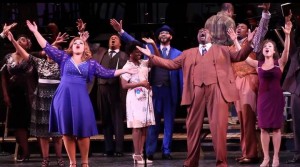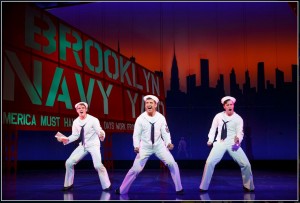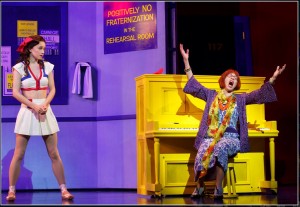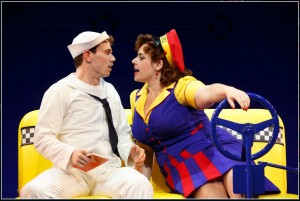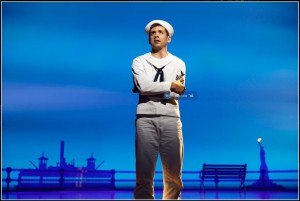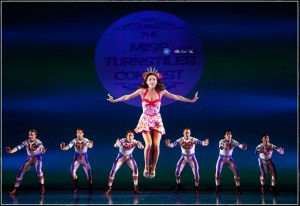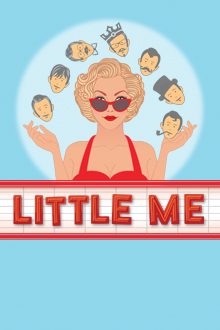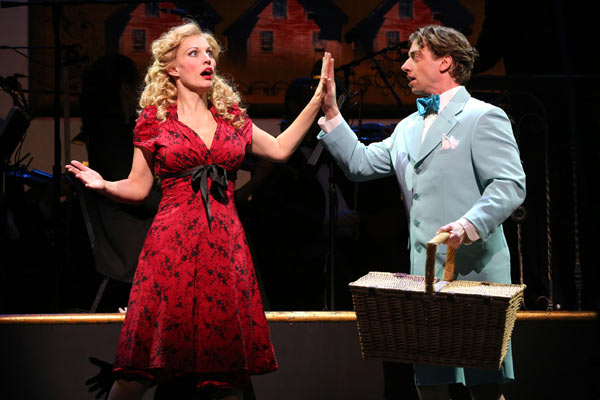Stark and Shtark
A review of the
National Yiddish Theatre Folksbiene Production of
FIDDLER ON THE ROOF (in Yiddish)
At the Museum of Jewish Heritage

August 19, 2018
GUEST REVIEWER: Moshe Bloxenheim
Now, I am not a natural Yiddish Speaker by any means and I entered the theater to see this Yiddish Production of FIDDLER ON THE ROOF with the attitude of one who might be going in to see an opera in a familiar but foreign language. To my amazement the addition of Yiddish to FIDDLER ON THE ROOF did not alienate me, nor did it feel like a gimmick. While the use of Mr. Shraga Freidman’s Yiddish translation did not always have the flowing poetry of the English of Mr. Joseph Stein’s book and Mr. Sheldon Harnick’s lyrics, the language had its own particularly biting beauty to the ear. Even in Mr. Friedman’s Yiddish rendition, Mr. Sheldon Harnick’s words still flow with Mr. Jerry Bock’s music in a classic unity, from the buoyant introductory song “Traditsye” [Tradition] to the final mournful and ironic “Anatevke” [Anatevka].
The plot itself may be a simplified adaptation of Mr. Sholom Aleichem’s Tevye stories, but this Yiddish FIDDLER ON THE ROOF gives me the sense of an old sepia photograph taken to preserve a sense of place.
Within this picture, we behold 1905 Anatevka – a village on the Russian Pale of Settlement. Tevye, the poor yet philosophical dairyman, scratches out a meager living for himself and his wife Golde and their five daughters. When Tevye’s older daughters reach out beyond the safe and traditional futures that their parents had expected for them, it signals the beginning of changes that will eventually overturn the seemingly stable world of Anatevka.
A keen cast of performers populate this little Shtetl.
Mr. Steven Skybell splendidly imbues Tevye with the weariness of a man who can barely get by, but he also shows Tevye’s spirit: that wonderfully wry sense of humor and the deeply personal – if sometimes annoyed – relationship with G-d that makes him so moving. This Tevye clearly values the past but will do his best to adjust to the changes that will affect him and his family. What is more, is start turns such as “Ven Ikn Bin a Rothchild” [If I were A Rich Man], Mr. Skybell knows how to stay admirably and enjoyably in character.
As Tevye’s wife, Golde, Ms. Jennifer Babiak gives a good performance. She is indeed the careworn wife and mother who manages, but wants security for her daughters. Ms. Babiak is fine singing the soulful “Shabes Brokhe” [Sabbath Prayer] and she gets good laughs when she chides of Tevye or reacts to Yenta. But I did not feel that Ms. Babiak’s Golde was the most wifely counterbalance to Tevye.
On the other hand, Ms. Rachel Zatcoff truly makes Tsaytl her father’s child. She is willing to do her best to be a good daughter, but she cannot keep silent when she feels her own life will be thrown away. When Tsaytl speaks up for herself, Ms. Zatcoff lets us feel the desperation and thrill of her audacity.
Similarly, Tevye’s second daughter Hodl discovers that her own future runs contrary to Anatevka and family expectations. Ms. Stephanie Lynn Mason skillfully portrays Hodl’s development as she discovers love and sees that the world is more than just Anatevka. In “Vayt Fun Mayn Liber Haym” [Far From The Home I Love] Tevye’s second daughter is not merely singing about the sorrow of leaving all that she held dear for love. Instead, Ms. Mason makes it clear that Hodl is now paying the price of looking beyond herself.
The role of Khave is a role of little dialogue yet she is the daughter who brings Tevye and Golde’s world crashing down. It is amazing how Ms. Rosie Jo Neddy still gives us the full emotional impact Khava’s choosing a man outside her faith and how it would make her an outcast. Tevye’s heartbreaking song “Khavaleh” becomes all the more affecting due to Ms. Neddy’s beautiful dancing.
What about the men who have won Tevye’s daughters?
It is possible to make Motl Kamzoyl a nebbish’l but if the likable Mr. Ben Liebert shows us a Motl who is meek, his Motl is also clearly in love with Tsaytl and takes inspiration from her – even facing Tevye for Tsaytl’s hand against all hope.
Mr. Daniel Kahn gives us a principled Pertshik who is out to want to improve the world and who thinks a bit too highly of his own ideas, but Mr. Kahn’s Pertshik wins us over with his open appreciation of Hodl who easily brings him down to earth. When he sings “Itst Hob Ikh Di Gantse Velt” [Now I Have Everything] Pertshik is not only a man who has found love but also humanity.
Compared to Motl and Pertshik, the Russian, Fyedke, has little to say. Nevertheless, the attractive Mr. Cameron Johnson says it with an honest flair. Singing and dancing, Mr. Johnson takes a memorable moment in the spotlight in “Lekhayim” [L’Chayim, To Life].
In spite of Leyzer-Volf being wrong for Tsatyle, Mr. Bruce Sabath makes us sympathize with this lonely widower, and like him. Unsuitable as he might be, it is clear that Mr. Sabath’s Lazar-Volf would try hard to make Tsaytl happy. In addition, Messrs. Sabath and Skybell know how to make the best out of their character’s bickering.
Of course Ms. Jackie Hoffman’s Yente the Matchmaker has her own definite opinions regarding girls who find their own husbands. Here is a hilariously sublime and all-too recognizable noodge: She busily rises above her own lone status, ignoring defeat as she poses and answers all her own questions, pushes some surreal matches and outright steals the very scenery.
Another delightfully notable presence was the spectre of Leyzer-Volf’s first vife, Frume-Sore, enacted with wickedly melodramatic abandon by Ms. Jodi Snyder.
Mr. Adam B. Shapiro plays the Rabbi of Anatevka with a sweet and sad buffoonery of a man who had always been assured and comfortable in his position and is now trying to use the same formulas in the face of circumstances he had never conceived of.
Any actor taking on the role of Der Gradavoy [The Constable] has to portray a prejudiced man who can countenance the persecution of innocents by government ukase. Mr. Bobby Underwood understandably avoids the easy melodrama inherent the role, but I felt his understatement was more a case of playing it safe.
Ms. Lauren Jeanne Thomas is excellent playing the Fiddler of the title, punctuating the show with her musical presence.
The rest of the company are first-rate as well and all bring this isolated community to vivid life..
Director Joel Grey has an admirable trust in the material, deftly interweaving the comedy and drama, never allowing the action to flag for a second. Every person seems to have a story in this Anatevka, even if there is not time enough for them to tell it — this is an even more noteworthy achievement when you realize that several of the performers are working phonetically in an unfamiliar language.
Although Choreographer Staś Kmieć is clearly influenced by Mr. Jerome Robbin’s staging of the original Broadway production, he creates a remarkable spectacle that is surprising for such a small venue. Besides the dancing, Mr. Kmieć works ideally with Mr. Grey to set up both public and private moments in the life of the community.
The orchestra is ably led by Mr. Zalmen Mlotek using Mr. Larry Blank’s adaptation of Mr. Don Walker’s original orchestrations for Mr. Jerry Bock’s wonderful music. Mr. Mlotek and his players appear onstage, underlining the fact that they too are part of the proceedings and can comment on and underline the action without intruding. In addition, Director Gray and Conductor Mlotek know how give those performers who were not so comfortable in Yiddish an air of fluency that happily fools those of us who are also not that familiar with the “Mamaloshen” [Mother Tongue].
Mr. Beowulf Boritt’s stark scenic design with its paper and fabric hangings and basic props are a suitable canvas for Messrs. Grey and Kmieć to paint a picture of the past. Assisted most effectively by Mr. Peter Kaczowrowski’s lighting, Ms. Ann Hould-Ward’s costumes and the hair and wigs of Mr. Tom Watson, the performers vividly summon up the houses and streets of Anatevka on the deceptively simple set.
I am always surprised when a small theater needs amplification, but Mr. Dan Moses Schreier’s sound designs are suitably understated. (Finally, I realize how apt the name Schreier – which is Yiddish for “a shouter” – is for audio work).
In all, the Yiddish FIDDLER ON THE ROOF is an amazing production that gives far more to the audience than one might expect. Would it be as satisfactory in English? That is something to consider, but not too intently, since this Yiddish Language production is quite marvelous as it is.
Having finished the overall review, I would like to applaud Mr. Sheldon Harnick, the original lyricist of FIDDLER ON THE ROOF who prevented the present adaptation from replacing the word “Tradition” with “The Torah”. Understandably, this change promises a real dramatic kick to the play but I believe it would make the whole premise of FIDDLER ON THE ROOF ring false. “Tradition” implies rules based on societal norms and roles. “The Torah” deals with the religious belief that defines Tevye and his community not merely as residents of Anatevka with quaint customs but as Jews. In FIDDLER ON THE ROOF Tevye struggles to balance his understood position in Anatevka with the changes that are threatening tradition while trying to understand what G-d would want from him. Under “Tradition” Tevye can question and even adapt, but he does not defy G-d. If “The Torah” became the theme, then we would be seeing Tevye and his neighbors finally being evicted from Anatevka for the very religion that Tevye would have been discarding all along.
Fiddler on the Roof (in Yiddish)
DIRECTED BY JOEL GREY
July 4, 2018 – Oct. 25, 2018
at Museum of Jewish Heritage
or call 866-811-4111
###########
About the reviewer:
MOSHE BLOXENHEIM

I am a computer programmer, wannabe writer who loves theater and just got into the habit of inflicting my theatrical opinions.
I live in New York.Moshe can be reached at MB1224@aol.com
###########

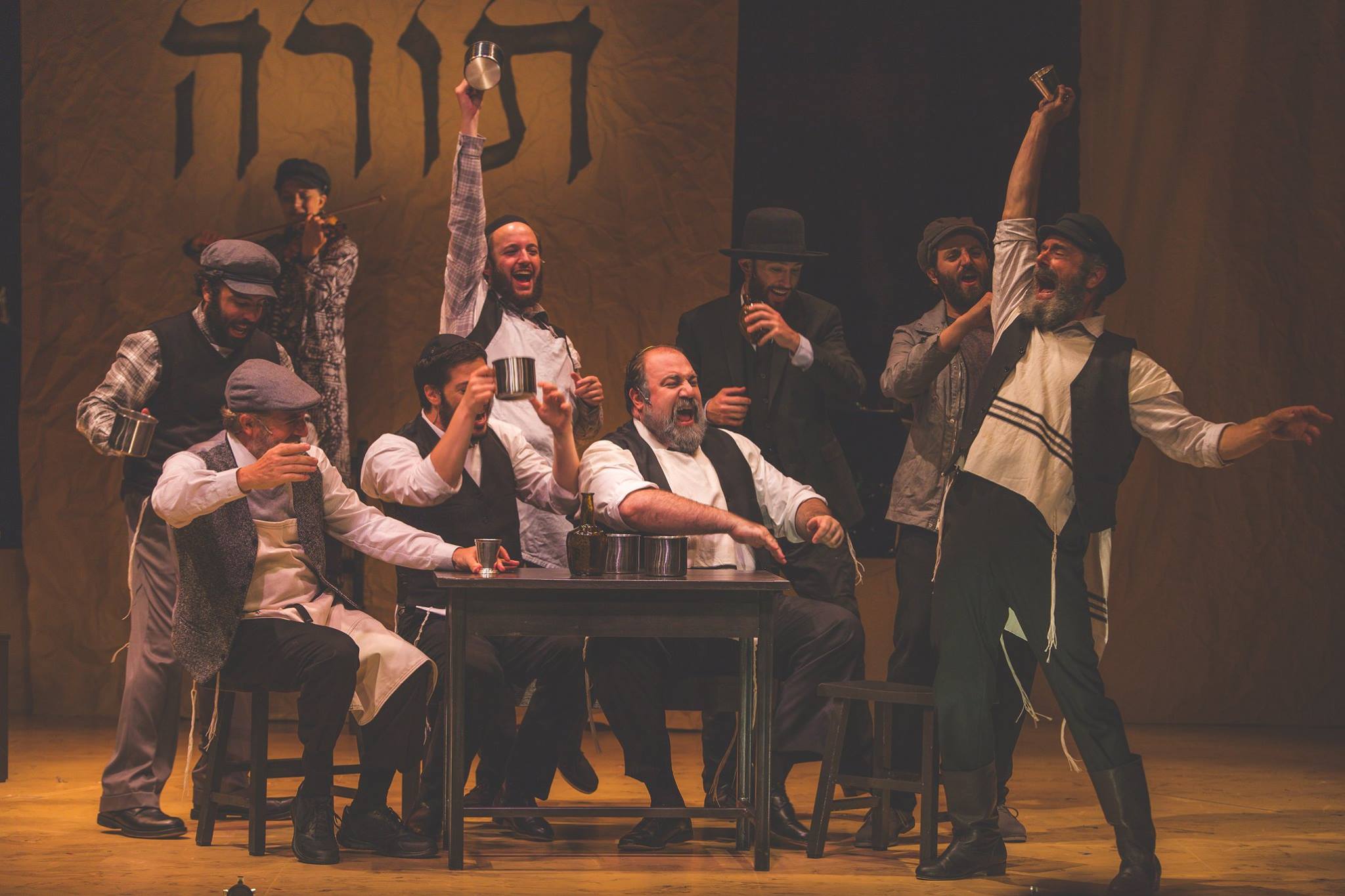
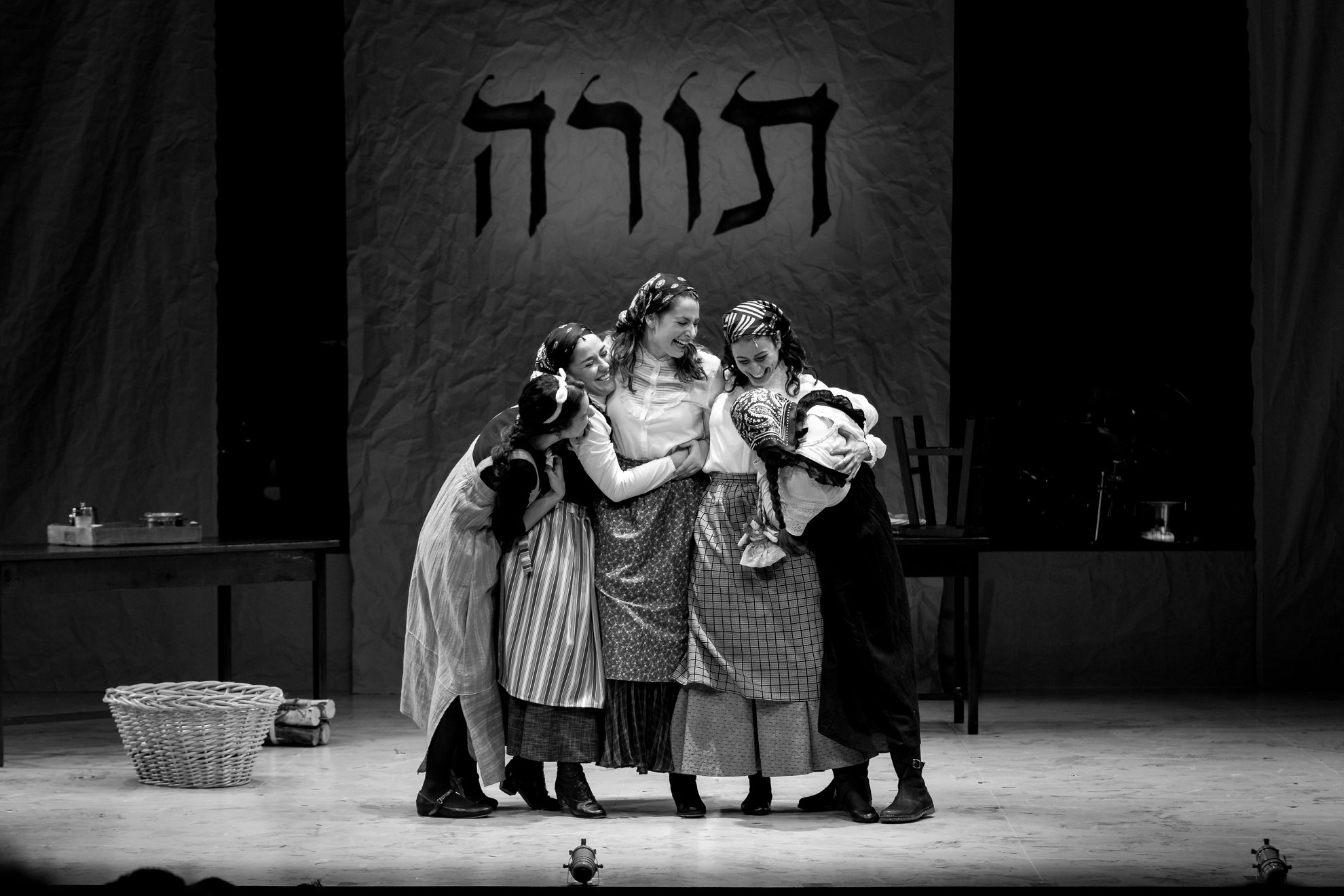
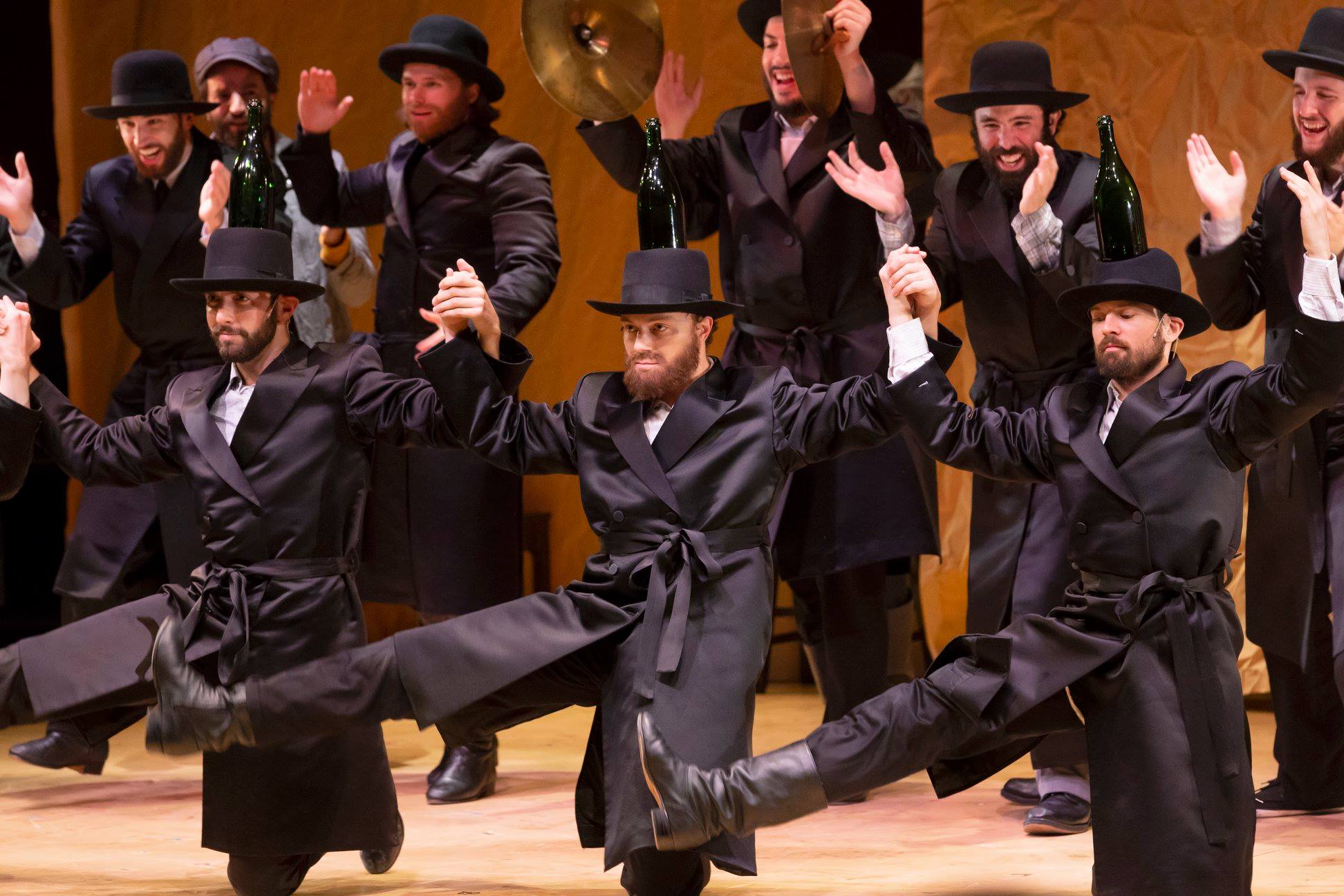
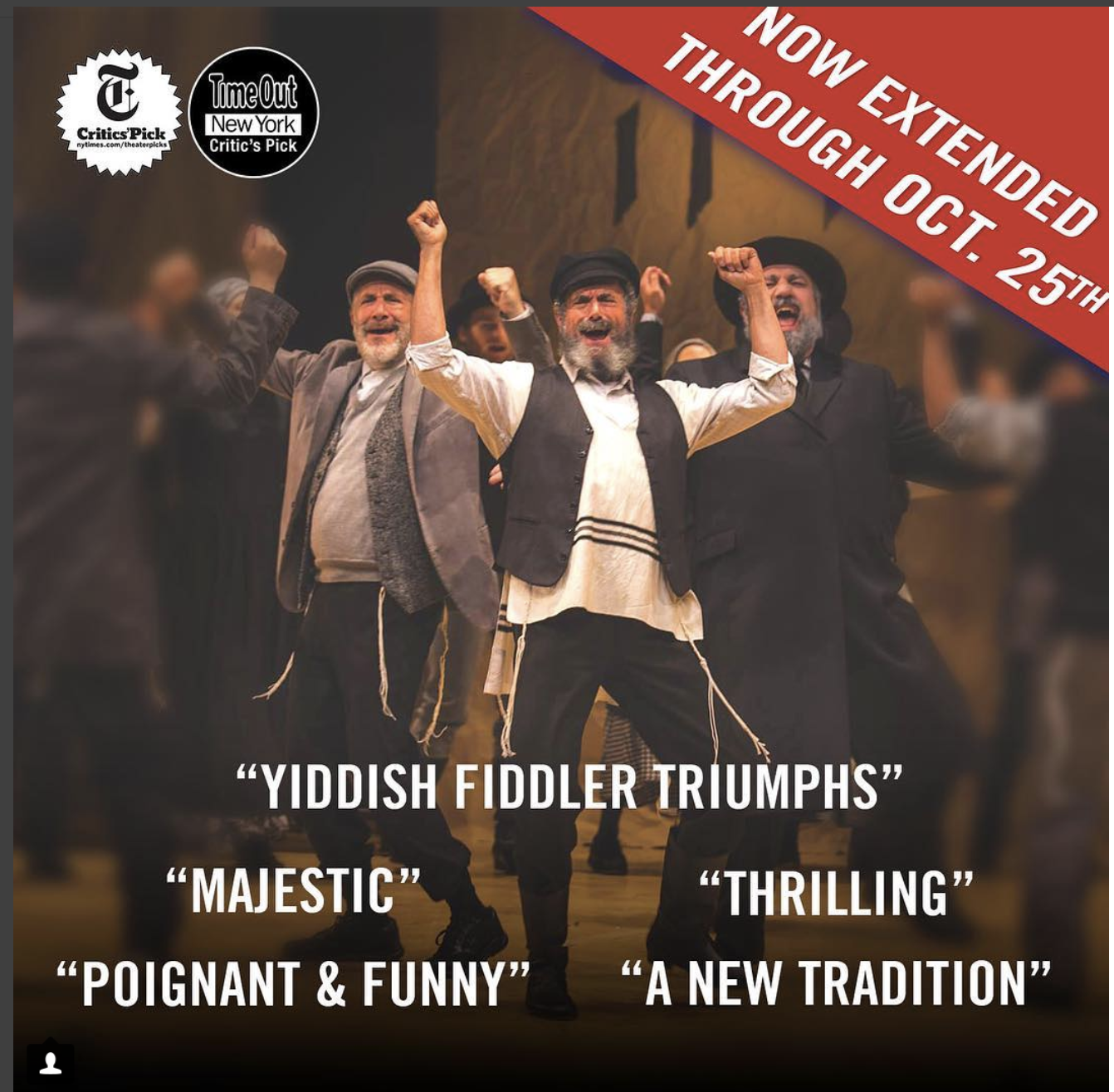


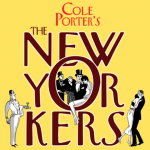
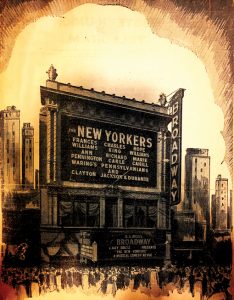 Director John Rando has no trouble with the fact that THE NEW YORKERS is a series of songs with barely enough plot to keep the show from being designated a revue or vaudeville (not that there would be a problem with either one). But Mr. Rando ensures that even with all the numbers being launched in so many ways by different people and acts that everyone gets to shine and nothing ever clashes so that the show buckets along engagingly to its loopy conclusion (the memorable “I Happen To Like New York” chorale). Mr. Chris Bailey’s choreography has a lot to do with this because so much movement and dancing carry THE NEW YORKERS forward. A gangster battle where the machine gun fire is enacted by tap-dance emphasizes the period, plot and cartoonish nature of the show since the assailants and their would-be targets just keep happily tapping and firing. More than that, the specialties are clearly staged to make the most of the talents involved yet invoke their predecessors in the roles. In fact, where many songs have at least a line to cue them in, Messrs. Rando and Viertel know that sometimes a song should be left to fend for itself and ensure that a moment like Ms. Cyrille Aimée’s singing of “Love for Sale” stands alone as the jewel of the show as the original piece did in 1930.
Director John Rando has no trouble with the fact that THE NEW YORKERS is a series of songs with barely enough plot to keep the show from being designated a revue or vaudeville (not that there would be a problem with either one). But Mr. Rando ensures that even with all the numbers being launched in so many ways by different people and acts that everyone gets to shine and nothing ever clashes so that the show buckets along engagingly to its loopy conclusion (the memorable “I Happen To Like New York” chorale). Mr. Chris Bailey’s choreography has a lot to do with this because so much movement and dancing carry THE NEW YORKERS forward. A gangster battle where the machine gun fire is enacted by tap-dance emphasizes the period, plot and cartoonish nature of the show since the assailants and their would-be targets just keep happily tapping and firing. More than that, the specialties are clearly staged to make the most of the talents involved yet invoke their predecessors in the roles. In fact, where many songs have at least a line to cue them in, Messrs. Rando and Viertel know that sometimes a song should be left to fend for itself and ensure that a moment like Ms. Cyrille Aimée’s singing of “Love for Sale” stands alone as the jewel of the show as the original piece did in 1930. Mr. Gordon Stanley is a perfectly peevish Prospector who is driven by oil and cannot see any romance beside it. He fits perfectly in with the Presidents who are played with relish by Messrs. Stephen Mo Hanan, Peter Land and J. Bernard Calloway. All the gentlemen gleefully twirl a metaphysical villainous mustache with panache, bringing their best to their anthem of greed “Just A Little Bit More” and being merrily hissable in “The Spring of Next year” where they exult in the destruction of Paris.
Mr. Gordon Stanley is a perfectly peevish Prospector who is driven by oil and cannot see any romance beside it. He fits perfectly in with the Presidents who are played with relish by Messrs. Stephen Mo Hanan, Peter Land and J. Bernard Calloway. All the gentlemen gleefully twirl a metaphysical villainous mustache with panache, bringing their best to their anthem of greed “Just A Little Bit More” and being merrily hissable in “The Spring of Next year” where they exult in the destruction of Paris. 
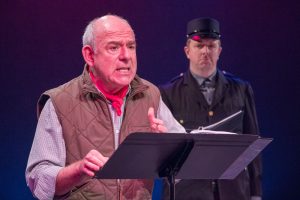 One of the Countess’ aides and links from the harsh real world to her romantic existence is Mr. Lenny Wolpe’s jovial Sewerman. From his number “Pretty Garbage” and onwards Mr. Wolpe creates a man who has his mind in the most delightful of gutters, giving cheerful denials about the outrageous world below that make it seem even more wonderful and fantastic. When the Sewerman gives a “sympathetic” defense of the rich in Act Two, Mr. Wolpe extracts some wonderfully timely comedy out of the moment.
One of the Countess’ aides and links from the harsh real world to her romantic existence is Mr. Lenny Wolpe’s jovial Sewerman. From his number “Pretty Garbage” and onwards Mr. Wolpe creates a man who has his mind in the most delightful of gutters, giving cheerful denials about the outrageous world below that make it seem even more wonderful and fantastic. When the Sewerman gives a “sympathetic” defense of the rich in Act Two, Mr. Wolpe extracts some wonderfully timely comedy out of the moment.  makes a beautiful Mute – the observer of all and assistant to the Countess. For a man who will not speak, Mr. Kristopher Thompson-Bolden’s Mute is a real chatty soul and can even deliver a song with flair – allowing gesture and dance to supply the lyrics that are then picked up and sung by the other performers.
makes a beautiful Mute – the observer of all and assistant to the Countess. For a man who will not speak, Mr. Kristopher Thompson-Bolden’s Mute is a real chatty soul and can even deliver a song with flair – allowing gesture and dance to supply the lyrics that are then picked up and sung by the other performers. Two other Madwomen assist the Countess: Ms. Alison Fraser gives us a striking and memorable Madame Constance, Madwoman of the Market. She could have jauntily stepped out of an Edward Gorey drawing but her fancies are less gothic and more aurally and erotically absurd.
Two other Madwomen assist the Countess: Ms. Alison Fraser gives us a striking and memorable Madame Constance, Madwoman of the Market. She could have jauntily stepped out of an Edward Gorey drawing but her fancies are less gothic and more aurally and erotically absurd.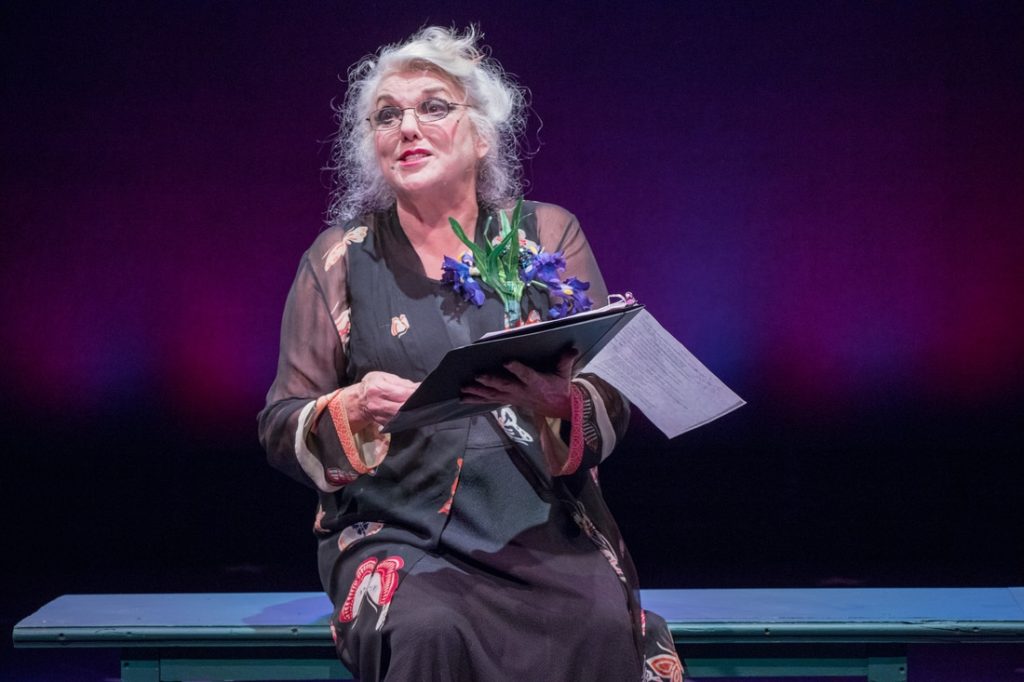
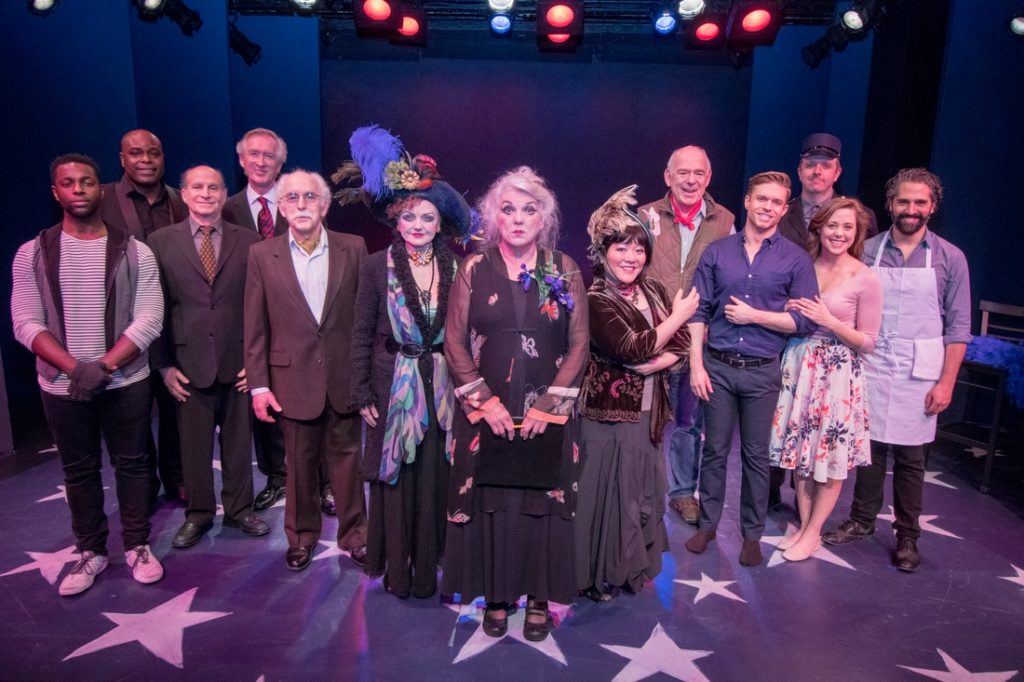
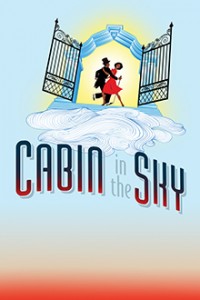

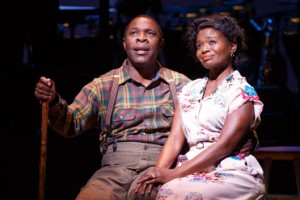 As for the object of Good and Bad’s dispute. Little Joe is a schmo, yet, we don’t wonder why Petunia bothers with him, because Mr. Michael Potts makes Little Joe Jackson a likeable and sympathetic hero. Indeed, Mr. Potts makes even Little Joe’s enjoyment of his newly virtuous life believable. His playfulness when singing “In My Old Virginia Home (On the River Nile)” with Petunia makes us fully appreciate why his wife has been fighting for him when she obviously can do better.
As for the object of Good and Bad’s dispute. Little Joe is a schmo, yet, we don’t wonder why Petunia bothers with him, because Mr. Michael Potts makes Little Joe Jackson a likeable and sympathetic hero. Indeed, Mr. Potts makes even Little Joe’s enjoyment of his newly virtuous life believable. His playfulness when singing “In My Old Virginia Home (On the River Nile)” with Petunia makes us fully appreciate why his wife has been fighting for him when she obviously can do better.